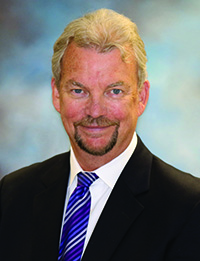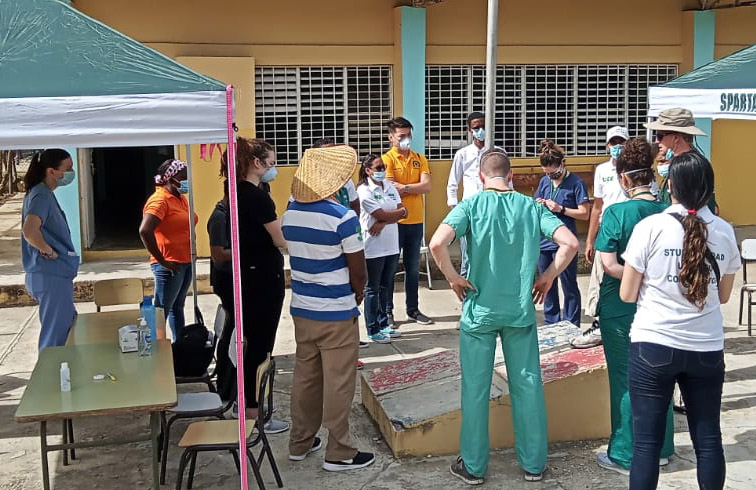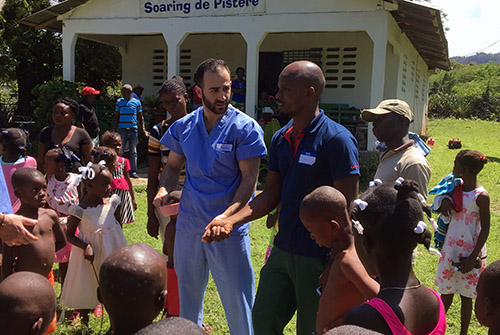Dean's Update 2021-08
August 20, 2021
Osteopathic physicians approach health holistically at the individual, family, and community levels, both locally and worldwide. Understanding that physicians provide better care when they have broader experiences with diverse people, cultures, and health care practices, the College of Osteopathic Medicine has invested in developing global health opportunities for research and applied medical training.
Increasingly, the reputation of our global health work has become a draw for osteopathic medical students, and contributes to the record number of applicants to our college year over year. In many ways, our international reach is a distinguishing feature of our medical school. Our ability to provide osteopathic healthcare education, conduct a variety of translational research, as well as participate in meaningful community engagement internationally, is something of which we can all be proud.
I have personally benefitted from the friendship and mentorship of William Cunningham, DO, MHA, associate dean for global health at the College of Osteopathic Medicine and the director for the Institute for Global Health (IGH). His wisdom certainly derives from an international perspective, and here he discusses the many international opportunities available through the college.
Global health opportunities: cultivating wider perspectives in medical training
Why is global health a priority for the College of Osteopathic Medicine?
A physician must have a wide perspective on people, culture, and languages. It is critical for the development of a well-rounded, holistic caregiver. Applying that experience and knowledge in a global context helps us understand different cultures and treat people who don’t have the same level or access to resources. Global health experience opens your consciousness to think in terms of the patient and their culture. It develops an 
When you talk about health care in the U.S., people think of a doctor with a stethoscope but in most of the world, health is defined very differently. The patients we serve think about health as food security, clean drinking water, a roof over their head, basic hygiene, or care for a mother and a newborn. Developing this experience, knowledge, and understanding of global health and the inequities across the world shapes how we as physicians provide care and serve patients.
How does bringing our knowledge and skills to other places help improve global health and vice versa?
Every time we go abroad, we bring a broader perspective of health care to those areas, but the countries we visit provide us more insight and education than we provide them. We learn how to handle difficult situations—how to provide care when you don’t have the resources or how to treat a patient for a certain disease when you don’t know if they’ll have access to long-term follow-up. It teaches us to be flexible and resourceful in how we provide care.
Our health care in the U.S. is the most expensive in the world. In our global health partnerships, we have learned that other countries with fewer resources and much less spending on health care have achieved the same, if not better, health metrics than the U.S. We can learn so much from these countries in how they do more with less.
What are your thoughts on the interconnectedness of health, and how what we are doing at MSU can impact health elsewhere, and vice versa?
One Health is one of our guiding principles of the global health master’s curriculum; it is holistically-based, like osteopathic medicine. You cannot separate the practice of human medicine, animal health, environmental health, and ecological health. They’re all inextricably linked. The politics, the economy, and social factors are all intertwined with the people and the populations, but also the health of the country itself. This isn't just about medicine—it’s about having a holistic understanding of health and taking an integrated approach to promote, protect, and improve the health of the populations we serve and that of the planet.
What are some global partnership highlights at the Institute for Global Health?
Our longest running program is our education and research in Malawi with Dr. Terrie Taylor, which has been practicing for 27 years. She lives there seven months out of the year and returns in the fall to teach a course in tropical medicine. MSU has a dorm for students studying abroad in Malawi.
We also have trips to Peru, Cuba and Mexico that have been running for over a decade, and those countries have College of Osteopathic Medicine 
The programs we’ve developed are focused on sustainability, education, and forming meaningful community partnerships. Our commitment to building sustainable programs allows us to offer continuity of care to the patients and the communities we serve—we revisit the same place and the same patients multiple times a year to provide follow-up care and to build on our research.
Three years ago, we formed the Education and Research Consortium of the Americas to advance education, research and capacity-building in other countries. We now have 12 members in a consortium in eight countries of Latin and South America.
What role does research play in these global health experiences for students and faculty?
On all our study abroad trips, faculty can introduce potential research to students with our partners in those countries. Our work in Iquitos, Peru, over the last eight years has resulted in more than 90 research projects and multiple publications from faculty and students working with our partner universities.
I’m excited about the increased emphasis on research in our college’s strategic plan. It will allow us to drive research initiatives through these programs.
What kind of growth or upcoming opportunities can we expect to see at IGH?
We are in the process of finalizing a
We are also expanding our international programs into clinical preceptorships, where not only will it be a study abroad program, but second year students will receive credit for one week of the preceptorship program. They can see patients with a faculty member in a teaching environment while experiencing a culturally diverse setting and diseases not commonly seen in the United States.
For the last 18 months COVID-19 has ravaged the world and we have been home-bound. The thirst of students to travel globally with us has not abated since the start of the pandemic and our programs continue to be very competitive.
We’re very fortunate to have the support of the college and faculty. The faculty are in these programs to teach, deliver, and impart their years of experience to the students. Our faculty and research drive these international opportunities and we could not continue without their support and the support of the Dean.

Andy Amalfitano
Dean
William Cunningham
Associate Dean for Global Health
Director of the Institute for Global Health
